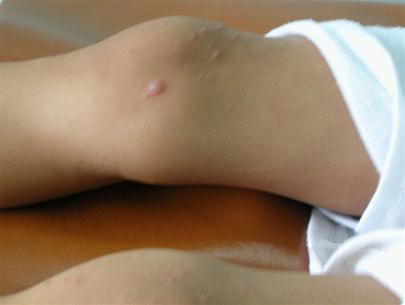Hand, foot and mouth disease: children can die!
More dangerous is that even if the disease has caused complications but doctors and family members do not even know that due to severe hand, foot and mouth disease, serious intervention needs timely intervention.
Misdiagnosed, serious complications
Hand, foot and mouth disease is not a newly emerging disease, in long-standing medical literature. However, most doctors and people do not know this disease because the disease was primarily caused by coxsakie agent - very benign - caused.
Recently, a new dangerous agent has also been discovered in the world, enterovirus 71. This agent is dangerous because it can cause complications in the brain and heart, causing high mortality and very fast. Because of not knowing this disease, sometimes it is sometimes wrongly diagnosed by the physician as chickenpox, skin infection or allergy .

Photos of water balloons floating on the knee area of children with hand, foot and mouth disease (Photo: TTO)
This disease is common in children under 5 years old and very contagious. Often spread quickly through the gastrointestinal tract and children live with houses and activities with the kindergarten. In summary of many years of Children's Hospital 1, Ho Chi Minh City, the disease occurs in two seasons of the year, from April 2-4 and then from September to December.
The manifestation of the disease is also very easy to recognize if noticed, it is the water balloons. The water ball is 2-10mm in size, gray, oval, often appearing on the buttocks, knees, palms, soles of the feet and often presses without pain. The water balloon also appears in the mouth and when it breaks, it causes ulcers in the mouth.
Last year, Children's Hospital 1, Ho Chi Minh City received 1,000 pediatric patients with 'hand, foot and mouth disease' , including 400 cases with complications requiring hospitalization. In the first two months of this year, there were 187 hospitalizations due to complications of this disease.
When floating, children may have a mild fever, fussy crying due to mouth pain, stop eating. The water ball will deflate and it can clear itself after 5-7 days. Some children have vomiting, diarrhea when they float or when the balloon has collapsed.
Most cases will go away on their own, but if the disease is caused by enterovirus 71, some children will have very dangerous complications such as encephalitis, myocarditis, and meningitis. The more dangerous thing is that these complications are difficult to detect early if physicians do not have experience and family members do not pay attention.
Children with cerebral complications often do not have a deep coma but have unnoticeable symptoms such as: difficulty sleeping, continuous crying, startled at waking or falling asleep, children may show panic, talk bullshit, chatter, tremor, convulsions.
Other symptoms can be seen when there are complications such as very high fever, vomiting and vomiting a lot, flaky skin, fast pulse but no high fever, weak limbs, mouth distortion. When children have complications if they are not treated properly and timely, they can die within a few hours.
Early detection, close monitoring
In order to detect early complications, it is important that when a child has hand, foot and mouth disease (water balloon symptoms in the arms, legs, or mouth), the relative tries to follow the child closely for at least eight days to immediately detect the signs signs of complications and brings the child to the hospital.
On the other hand, if any of the above unusual symptoms are found, find out if the child has water bubbles in the palms, soles of the feet, knees, and buttocks. If so, quickly bring your child to the hospital. For uncomplicated cases, it is possible to treat at home with pain relievers, give them liquid, easy-to-digest foods, try to feed them into many meals.
Currently the agent enterovirus 71 does not have a vaccine, so the best way to prevent it is to ensure hygiene in eating. Children should be absent from school or avoid contact with sick children when sharing a home because the disease is highly contagious from one child to another when exposed.
Dr. TRUONG HUU KHANH (Dean of Pediatric Infection Department 1)
- Hand, foot and mouth disease in the season: Things to know
- Why is EV71 virus strain causing hand, foot and mouth disease dangerous to death?
- Hand and foot and mouth disease increased in Hanoi
- Hand-foot-mouth disease is showing flare up
- High alert for hand, foot and mouth disease
- Preventing hand, foot and mouth disease for children in back-to-school season
- Occurrence of hand and foot disease in Hanoi
- China declared a vaccine for hand-foot-mouth disease
- 4 mistakes when caring for children with hand, foot and mouth disease
- Hand, foot and mouth disease re-exported in China
- Detecting the type of gene that causes hand, foot and mouth disease
- Hand, foot and mouth disease: Warning of neurological complications
 Green tea cleans teeth better than mouthwash?
Green tea cleans teeth better than mouthwash? Death kiss: This is why you should not let anyone kiss your baby's lips
Death kiss: This is why you should not let anyone kiss your baby's lips What is salmonellosis?
What is salmonellosis? Caution should be exercised when using aloe vera through eating and drinking
Caution should be exercised when using aloe vera through eating and drinking